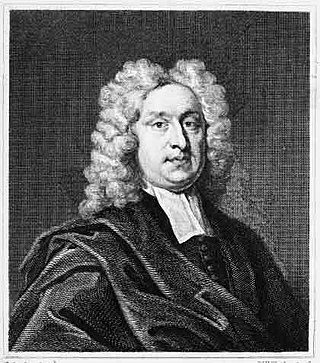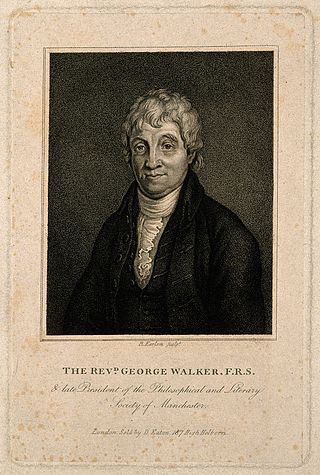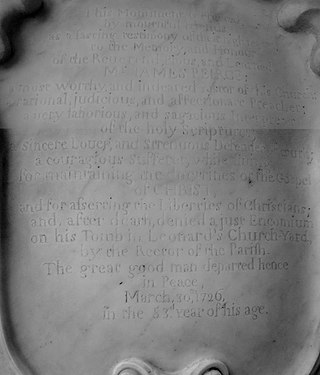Related Research Articles

Matthew Poole (1624–1679) was an English Non-conformist theologian and biblical commentator.
John Eadie was a Scottish theologian and biblical critic.

Edmund Calamy was an English Nonconformist churchman and historian.

Micaiah Towgood (1700–1792) was an English Dissenting minister in Exeter, of Arian views. He is known as a theological controversialist.
John Brinsley the Younger (1600–1665) was an English nonconforming clergyman, an ejected minister in 1662.

George Walker was a versatile English Dissenter, known as a mathematician, theologian, Fellow of the Royal Society, and activist.
John Seddon (1725–1770) was an English Dissenter and rector of Warrington Academy.
Joshua Oldfield, was an English presbyterian divine.
Samuel Bourn (1714–1796) was an English Dissenter minister.
Samuel Bourn the Younger was an English dissenting minister. He was an English presbyterian preaching on protestant values learned from the New Testament. Through his published sermons, he entered the theological debate that flourished around the Arian controversy, and the doctrinal question as to Man's essential nature. He contested the Deism of the Norwich rationalists in the early enlightenment, and challenged the Trinitarian conventional wisdoms about the seat of humanity and its origins.

James Peirce (1674?–1726) was an English dissenting minister, the catalyst for the Salter's Hall controversy.

William Tong (1662–1727) was an English Presbyterian minister, at the heart of the subscription debate of 1718.
Henry Finch (1633–1704) was an English ejected minister.
William Turner (1714–1794) was an English dissenting minister. He became liberal in theology, a supporter of rational dissent, and with his congregation in favour of social and political reform. He was a contributor to Theological Repository.
Samuel Haliday or Hollyday (1685–1739) was an Irish Presbyterian non-subscribing minister, to the "first congregation" of Belfast.
Thomas Grantham (1634–1692) was an English General Baptist minister, and theologian. He had access to Charles II of England, and made petitions on behalf of Baptist beliefs.
Charles Bulkley (1719–1797) was an English Baptist minister.
Charles Lloyd LL.D. (1766–1829) was a Welsh dissenter and schoolmaster.
Samuel Cradock, B.D. (1621?–1706) was a nonconformist tutor, who was born about 1621. He was an elder brother of Zachary Cradock.

Timothy Cruso (1657–1697) was an English Presbyterian minister and writer. He studied in the Newington Green Academy; proceeded M.A. at one of the Scotch universities; was pastor at Crutched Friars in 1688; was appointed to the Pinners Hall merchants' lectureship in 1694; and died at an early age in 1697—just eight years before Defoe wrote Robinson Crusoe and immortalised his name. Cruso also published homilies and sermons.
References
- 1 2 3 4 Munimenta Alme Universitatis Glasguensis. Records of the University of Glasgow, from its foundation till 1727 p.xxii
- ↑ Wright, Stephen. "Chorley, Josiah". Oxford Dictionary of National Biography (online ed.). Oxford University Press. doi:10.1093/ref:odnb/5352.(Subscription or UK public library membership required.)
- ↑ "Chorley, Josiah (5352)". A Cambridge Alumni Database. University of Cambridge.
- ↑ See Chorley's letter to Say, 11 December 1712, in The Say Papers, Monthly Repository, 1810